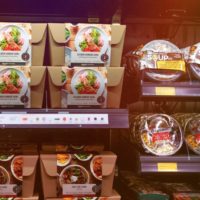
Every week we track the business, tech and investment trends in CPG, retail, restaurants, agriculture, cooking and health, so you don’t have to. Here are some of this week’s top headlines.
Loup Ventures’ Gene Munster predicted that Amazon will acquire Target this year, which is certainly an interesting twist. The Internet is going crazy of a New York Times story about raw water, or unfiltered, untreated spring water, that is selling for $37-$60 per gallon in Silicon Valley.
Australia has announced that it will be the fourth country to permit medicinal cannabis exports in hopes of boosting domestic marijuana production.
The delivery world is seeing some interesting changes. UberEats is launching a Loyalty Program that will potentially bypass delivery fees and offer significant promotions. Deliveroo is expanding to India. Malaysia-based Dahmakan just raised $2.6 million with plans to expand its end-to-end delivery service across Southeast Asia.
Some notable food trends of 2018 include medicinal mushrooms, high-end non-alcoholic drinks, upcycled foods, food transparency and ancient grains.
Check out our weekly round-up of last week’s top food startup, tech and innovation news below or peruse the full newsletter here.
_______________
1. Literally Every Single Food Trend Predicted to Take Over 2018 – Eater
This is the year for regional Mexican food, Earl Grey tea and “functional mushrooms.”
2. Here’s Why Amazon May Not Buy Target – CNBC
Target is the “lost child” of retailers, with no clear core competency. When Amazon does a big deal, it is looking for explicit capacities it lacks in areas it has already found challenging.
3. Unfiltered Fervor: The Rush to Get Off the Water Grid – New York Times
West Coast startups are delivering untreated water on demand. The off-grid water movement has grown with sophisticated marketing, cultural cachet, millions of dollars in funding and influential supporters from Silicon Valley.
4. LG’s New Robots Deliver Food and Double as Shopping Carts – TechCrunch
LG plans to debut a trio of robots next week. A porter robot designed for airport services, a serving robot for airport lounges and hotels as well as a robot that features a shopping basket and barcode reader.
5. Israel: Lab-Made Meat Startup SuperMeat Raises $3M Seed to Develop ‘Clean’ Chicken – TechCrunch
SuperMeat was backed by New Crop Capital, Stray Dog Capital and PHW, one of Europe’s largest poultry producers. It hopes to create lab-made chicken for processed foods in 3 years.
6. Sweden: Matsmart Raises €7.5M to Tackle Food Waste in Europe – The Spoon
The new funding will help the startup expand its e-commerce marketplace that sells surplus food across the Nordic countries and into Europe.
7. UK Based Food Delivery Giant Deliveroo To Set Up India Operations – Inc42
Valued at $2b, the startup is reportedly looking to hire a country head, who would be spearheading its India launch. Once it enters the Indian food delivery space, it will be competing against the likes of Zomato, Swiggy and Foodpanda.
8. Malaysia’s Dahmakan Chows Down $2.6M for Its End-to-End Food Delivery Service – TechCrunch
The round was led by Y Combinator, Texas Atlantic Capital, Atami Capital, a former founder of PE Fund APAX Partners as well as existing backers. The funds will be used to explore expansion across Southeast Asia.
9. Australia to Permit Medicinal Cannabis Exports in Bid to Capture Lucrative Market – CNBC
Australia plans to become the fourth country in the world to legalize medicinal marijuana exports in a bid to score a piece of the estimated $55b global market. The government hopes domestic medicinal use and exports will rapidly boost production.
10. Access to Capital Is Biggest Challenge to Indoor Farms – AgFunder
A new report by Agrilyst found that 25% of indoor farmers say that access to capital is their biggest growth hurdle. Difficulty fundraising naturally has an impact on revenue growth and ultimately profitability.
11. Navigating the Uncanny Valley of Food – Wired
The Uncanny Valley hypothesis proposes that near-perfect human replicas elicit a specific form of revulsion. Demand is pushing food industry innovation deeper into the realm of imitation, but companies like Hampton Creek and Memphis Meats should be wary of stumbling into another uncanny valley.
12. Uber Is Testing Loyalty Programs for Its Food Delivery Business – Business Insider
The UberEats loyalty program could potentially allow users to bypass delivery fees as well as gain access to promotions and exclusive menus.





